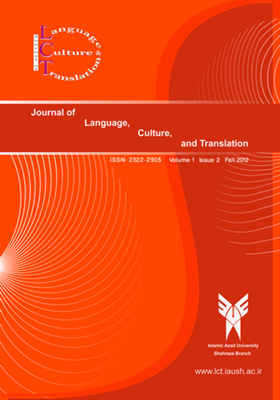Congratulation Speech Acts Across Cultures: The Case of English, Persian, and Arabic
محورهای موضوعی : نشریه تخصصی زبان، فرهنگ، و ترجمه (دوفصلنامه)حسین وحید دستجردی 1 , نجمه نصری 2
1 - دانشیار، دانشگاه آزاد اسلامی، واحد شهرضا
2 - دانشجوی دکتری آموزش زبان انگلیسی، دانشگاه اصفهان
کلید واژه: DCT, Speech Act, Status, congratulations, cross-cultural pragmatics, IFID,
چکیده مقاله :
The present study is an attempt to investigate the cross-cultural differences with regards to the production of a relatively understudied speech act, namely, congratulations. To this end, 48 American native speakers were asked to fill out a Discourse Completion Test (DCT) consisting of 4 situations on each of which the participants were asked to offer congratulations. Besides, the translated versions of the DCT were used to elicit data from 50 Persian native speakers as well as 44 native speakers of Syrian Arabic language. The corpus was analyzed to determine the congratulation strategies used and the frequencies of their occurrence. The content of semantic formulas as well as their shifts according to the status of the hearer were also investigated. Analysis of the data revealed several similarities and differences among the three groups, which will have implications for researchers as well as language teachers.
تحقیق حاضر بر آن است تا تفاوت های زبانی تبریک گفتن را بر اساس ج نبه های موقعیتی متفاوت در فرهنگ های گوناگون بررسی نماید . برای این منظور از 48 نفر ا مریکایی انگلیسی زبان خواسته شد آ زمون که حاوی 10 موقعیت بیانی تبریک گفتن است را تکمیل کنند . نسخه ترجمه شده این (DTC) تکمیل گفتارآزمون در اختیار 50 نفر فارس ی زبان و 44 نفر عرب زبان سوری قرار داده شد . داده های به دست آمده از شرکت کنندگان به منظور تعیین راهکارهای موجود و فراوان مربوط به هر گروه مورد بررسی قرار گرفت. به علاوه محتوای فرمول های معنایی همراه با تغییرات مرتبط با ش أن و مرتبه اجتماعی مخاطبان ارزیابی شد. نتایج حاصله حاکی از وجود تعداد قابل ملاحظه ای تفاوت و تشابه بین سه گروه مورد مطالعه بود. این تحقیق دستاوردهای کاربردی مهمی برای محققین و مدرسین زبان به همراه دارد که در بخش مربوط ذکر شده است.
Allami, H., & Naeimi, A. (2011). A cross-linguistic study of refusals: An analysis of pragmatic competence development in Iranian EFL learners. Journal of Pragmatics 43, 385-406.
Allami, H., & Nekouzadeh, M. (2011). Congratulation and positive politeness strategies in Iranian context. Theory and Practice in Language Studies,
1 (11), pp. 1607-1613
Al-Zumor, A.W., (2011). Apologies in Arabic and English: An inter-language and cross-cultural study. Journal of King Saud University- Language and Translation 23, 19-28.
Austin, J.L, (1962). How to do things with words. Cambridge, MA: Harward University Press.
Bataineh, R. F., & Bataineh, R.F. (2008). A cross-cultural comparison of apologies by native speakers of American English and Jordanian Arabic. Journal of Pragmatics 40, 792–821.
Blumkulka, S., House, J., & Kasper, G. (Eds.). (1989). Cross-cultural pragmatics: requests and apologies. Norwood, NJ: Albex.
Brown, P., & Levinson, S. C., (1987). Politeness: Some Universals in Language Usage. Cambridge University Press, Cambridge.
Chafe, W. (1980). The deployment of consciousness in the production of a narrative. In W. Chafe (ed.): The peer stories: cognitive, cultural, and linguistic aspects of narrative production. Norwood: NJ: Albex.
Cohen, A., (1996). Developing the ability to perform speech acts. Studies in Second Language Acquisition 18, 253–267.
Coulmas, F., (1979). On the sociolinguistic relevance of routine formula. Journal of Pragmatics 3, 238-266.
Elwood, K. (2004). “Congratulations”: A cross-cultural analysis of responses to another’s happy news. [Retrieved July 25, 2010, from http://dspace.wul.waseda.ac.jp/dspace/handle/2065/6097]
Eslami-Rasekh, Z., A. Eslami-Rasekh & A. Fatahi. (2004). The effect of explicit metalinguistic instruction on the speech act awareness of advanced EFL students. TESL.EJ 8(2), 1-12.
Eslami-Rasekh, Z. (1993). A cross-cultural comparison of the requestive speech act realization patterns in Persian and American English. Pragmatics language Learning Monogragh Se., 4, 85-101.
G.Emery, P. (2000). Greeting, congratulation and commiserating in Oman Arabic. Language, Culture and Curriculum.13, 2, 196-216.
Green, G. (1975). How to get people to do things with words. In P. cole & J. Morgan (Eds.), Syntax and semantics. Speech acts 3, 107-142.
Grice, Paul H. (1975). Logical and conversation. In P. cole & J. Morgan (Eds.), Syntax and semantics. Speech acts, 41-58.
Hill, B., S. Ide, S. Ikuta, A. Kawasaki, & T. Ogino. (1986). Universals of linguistic politeness: quantitative evidence from Japanese and American English. Journal of Pragmatics 10, 347-371.
Hinkel., E. (1997). Appropriateness of a device: DCT and multiple-choice data. Applied Linguistics 18, 1-26.
Isaacs, E. & Clark, H. (1990). Ostensible invitations. Language in society 19, 493-509.
Krippendorf, K. (1980). Content analysis: An introduction to its methodology. Beverly Hills, CA:sage.
Lipson, M. (1994). Apologizing in Italian and English. IRAL 32 (1), 19–39.
Makri-Tsilpakou, M. (2001). Congratulations and Bravo! In A. Bayraktaroglu & M. Sifianou (Eds.) Linguistic politeness across boundaries: the case of Greek and Turkish, 137-176.
Nelson, G.L., Carson, J., Al Batal, M., & El Bakary, W. (2002). Cross-cultural pragmatics: strategy use in Egyptian Arabic and American English refusals. Applied Linguistics 23 (2), 163–189.
Nureddeen, F.A. (2008). Cross cultural pragmatics: Apology strategies in Sudanese Arabic. Journal of Pragmatics 40, 279–306.
Olshtain, E. & L. Weinbach. (1985). Complaints: A study of speech act behavior among native and nonnative speakers of Hebrew. In: The Pragmatic Perspective: Selected Papers from the 1985 International Pragmatics Conference, Amesterdam/Philadelphia, 195-208.
Rose, K. R. (1994). On the validity of Discourse Completion Tests in non-western contexts. Applied Linguistics 15, 1-14.
Rose, K. & R. Ono. (1995). Eliciting speech act data in Japanese: the effect of questionnaire type. Language Learning 45, 191-223.
Searle, J.R. (1969). Speech Acts: An Essay in the Philosophy of Language. Cambridge University Press.
Thomas, J. (1983). Cross-cultural pragmatic failure. Applied Linguistics 4 (2), 91–112.
Turnball, W. (2001). Wierzbicka, A., 1985. Different cultures, different languages, different speech acts. Pragmatics 11, 31-61.
Wierzbicka, A. (1985). Different cultures, different languages, different speech acts. Journal of Pragmatics 9, 145– 178.


